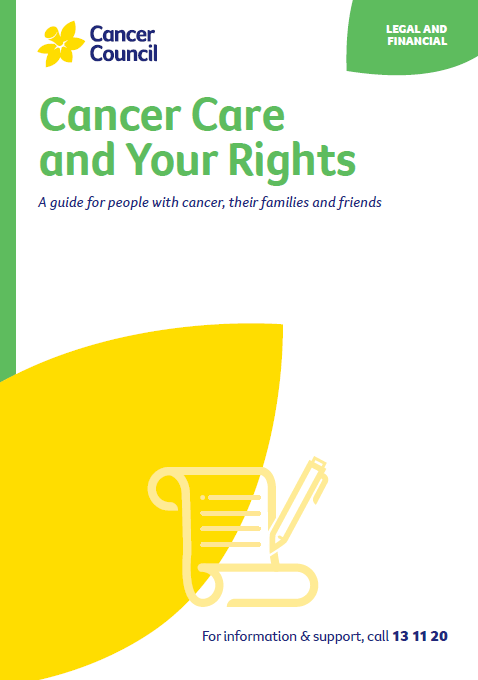- Home
- About Cancer
- Coping with a diagnosis
- Cancer care and your rights
- Navigating the health care system
- Private health care
Private health care
Some people prefer to be treated as a private patient so they can choose their own doctor, and may not have to wait as long for treatment. You can be treated as a private patient in both public and private hospitals and health services. The cancer care services delivered in the public system are also offered in the private sector.
Learn more about:
Fees
Doctors, service providers and hospitals in the private sector can set their own fees. Some people pay for private health insurance to help cover the extra cost of treatment as a private patient in hospital. If a health service provided in a private hospital is on the Medicare Benefits Schedule, Medicare covers 75% of the schedule fee for some services and private health insurance may cover at least 25%. Many doctors charge more than the schedule fee. Your health insurer may cover some or all of this cost; you will have to pay any costs not covered (gap payment). Learn more about Medicare benefits for GP visits.
You will also be charged for hospital accommodation, operating theatre fees and medicines. Private health insurance may cover some or all of these costs, depending on your policy.
Discuss costs
Before being admitted to hospital as a private patient, it’s helpful to ask:
- your doctor for a written estimate of their fees (and if there will be a gap), who else will care for you (e.g. an anaesthetist or surgical assistant), and how you can find out what their fees will be
- your private health fund (if you belong to one) what costs they will cover and what you’ll have to pay – some funds only pay benefits for services at certain hospitals
- the hospital if there are any extra treatment and medicine costs.
Health funds may make arrangements with some doctors about gap payments. Using the doctors and hospitals that take part in your health insurer’s medical gap scheme can help reduce out-of-pocket costs.
Public hospitals
If you choose to be treated as a private patient in a public hospital, it is usually arranged on admission. However, if you have been admitted to hospital through the emergency department, an administration officer may come to your bedside to ask if you want to be treated as a private or a public patient.
You don’t have to decide straightaway. You may like to first talk to your health fund or a patient liaison officer at the hospital.
Many people treated privately are surprised that they have to pay additional costs not covered by Medicare or their private health fund. It is important to ask about out-of-pocket costs before treatment.
Private health insurance
Some people choose to take out private health insurance to help cover their future health care expenses. The amount you pay (the premium) and the health services covered vary depending on the company and the type of policy you select.
As a privately insured patient, you can choose your own doctor, and you can choose to be treated in a private hospital or as a private patient in a public hospital. It is likely that you will have some out-of-pocket costs.
You can get hospital cover as well as cover for extras such as dental, optical and physiotherapy treatments. After you take out a policy, there will usually be a waiting period before you can claim benefits. For a general list of what Medicare and private health insurance covers in Australia, visit privatehealth.gov.au/health-insurance/what-is-covered.
Download our fact sheet on Insurance and cancer.
→ READ MORE: What is Medicare?
Podcast: Coping with a cancer diagnosis
Listen to more of our podcast for people affected by cancer
More resources
Prof Sarah Lewis, Faculty of Medicine and Health, The University of Sydney, NSW; Kevin Bloom, Senior Social Worker, Haematology and Bone Marrow Transplant, Royal North Shore Hospital, NSW; Danielle Curnoe, Consumer; Alana Fitzgibbon, Clinical Nurse Consultant – Gastro-Intestinal Cancers, Cancer Services, Royal Hobart Hospital, TAS; Hall & Wilcox (law firm); Johanna Jordaan, Consumer; Dr Deme Karikios, Medical Oncologist, Nepean Cancer and Wellness Centre, Nepean Hospital, NSW; Melissa Lawrie, Breast Cancer Clinical Nurse, Cancer Services, Gold Coast Hospital and Health Service, QLD; Jacqueline Lesage, Consumer Reviewer, Cancer Voices NSW; McCabe Centre for Law and Cancer, VIC; Louise Pellerade, 13 11 20 Consultant, Cancer Council WA; Andrew Potter, Consumer; Siân Slade, PhD Candidate, Nossal Institute for Global Health and Non-Executive Director (health, disability sectors), VIC; Paula Watt, Clinical Psychologist, WOMEN Centre, WA.
View the Cancer Council NSW editorial policy.
View all publications or call 13 11 20 for free printed copies.
Need to talk?
Support services
Coping with cancer?
Speak to a health professional or to someone who has been there, or find a support group or forum
Need legal and financial assistance?
Pro bono services, financial and legal assistance, and no interest loans
Cancer information
Dealing with the diagnosis
Common reactions to a cancer diagnosis and how to find hope
Cancer, work and you
Learn how cancer and its treatment can affect your work life, and how to manage this

